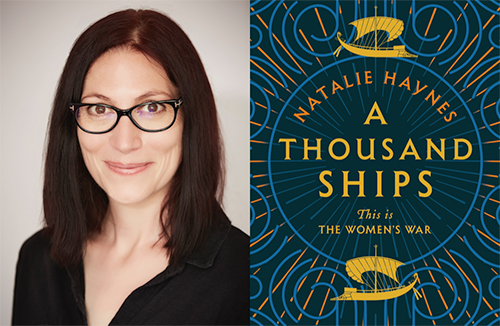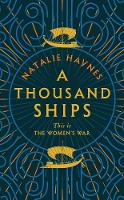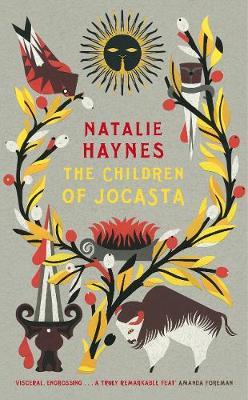I have to admit that I have limited knowledge about ancient Roman and Greek history, but Natalie Haynes' passion for the classics leaps off the stage and takes you on a rollicking ride through the Trojan War. Like most people, we all know about the story of the Trojan Horse and how the Greeks tricked the Trojans and ultimately defeated them.
Natalie's enthusiasm was palpable, but sometimes I found she spoke so quickly that some of her talk was lost to me. And, although she hails from Birmingham, her Brummie accent has been softened by years of academia so it was the pace that was my problem. However, when she did slow down, she had much fascinating information to impart. Perhaps she was conscious of wanting to fit a lot into the time slot.
What I did learn was that the Trojan War is one of four big cycles of ancient Greek history, the others being the Theban Cycle, the Labours of Heracles (Hercules is his Roman name) and the Golden Fleece.
Haynes observed that some of the interesting participants in the Trojan War had been largely lost in the mists of time such as Penthesilea, Queen of the Amazons, and Memnon, the Ethiopian King, both of whom were allies of the Trojans.
When she was 15, Haynes was given Homer's poem The Iliad as the set text for her GCSE exams and this ignited her lifelong love of the classics. Initially, the teenage Haynes had no sympathy for the Trojans because she "thought they were a bit thick", but the more she studied The Iliad and other classic texts, the more she realised that there were a number of reasons that the Trojans had brought the Trojan Horse inside the walls of the besieged city. The Trojans thought that the wooden horse was a Greek offering to the gods so that the gods would grant the Greeks a safe passage home so the Trojans wanted to wreck the Greeks' luck. The Trojans consulted their priest, Laocoön, who coined the famous phrase, "Beware of Greeks bearing gifts". Laocoön advised the Trojans to burn the horse where it stood outside the city, but the gods sent two sea serpents who wrapped themselves around the priest and his two infants and killed them. Things were further compounded when Trojan scouts found a lone Greek hiding in some reeds who had been left behind by his comrades. This prisoner convinced the King of Troy, Priam, that he was to have been a human sacrifice to the gods, but had escaped. He also said that if the Trojans destroyed the horse, the Greeks would get home safely. The Trojans foolishly believed this prisoner and we know where that got them.
Haynes pointed out that besides the version we are familiar with in which Paris takes Helen to Troy willingly or by kidnapping her, there are other versions. One version has the gods sending an "air version" (think ancient version of a hologram) of Helen to Troy while the real Helen went to Egypt. Another version has Helen off somewhere raising a bilingual sheep. Haynes found it frustrating that the two languages the sheep speaks are never revealed.
Part of Haynes' mission, she explained, was to put the women back into ancient history. On Greek vases, the Amazons were the second most popular depiction after Heracles. Euripides wrote eight plays about the Trojan War and seven of these plays have women as their focal characters.
The Iliad is comprised of twenty-four books and Haynes proceeded to give her audience a quick-fire summary of each of these twenty-four. For the sake of space, I won't reproduce her summary here (sometimes there is no substitute for being there). Suffice to say that it begins with Achilles, the great warrior, spitting the dummy and withdrawing from the war because of a fight over a woman with Agamemnon. Some things never change. And it ends with the gods intervening, Priam begging Achilles for the body of his dead son, Hector, and Hector's very emotional funeral.
Natalie Haynes is a wonderful conduit between the world of classical academia and the outside world for whom she makes the world of the ancients really come alive.
More
Natalie Haynes is the star of the BBC Radio 4 series Natalie Haynes Stands Up for the Classics.
- Borrow A Thousand Ships from the library.
- Find more books by Natalie Haynes in our collection.
- Visit Natalie Haynes' website.
- Find more resources on the Trojan War.
WORD Christchurch Shifting Points of View
WORD Christchurch presents Shifting Points of View — a spectacular line-up of New Zealand and international speakers to warm you up and get you thinking. Shifting Points of View runs from Sunday 18 August to Saturday 14 September 2019. Visit our page on WORD Christchurch Shifting Points of View for more information, previews, reviews, and WORD reading.








Add a comment to: Natalie Haynes, Troy Story – WORD Christchurch